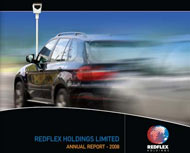12/23/2009
Redflex Profit Nosedives as Motorists Ignore Photo TicketsProfits for Australian photo enforcement giant shrink as Arizona speed camera program fails and motorists tear up tickets.

As the recession continues, more and more motorists have decided to ignore red light camera and speed camera tickets issued by private companies like Redflex Traffic Systems. According to a report issued earlier today by the Australian photo enforcement giant, such non-payment contributed to a significant drop in expected profit for the first half of the fiscal year. Previously reported problems, such as the "expensive failure" of freeway photo radar in Arizona, led to a shareholder revolt last month.
"Despite earlier expectations that the Arizona state-wide photo enforcement program would make a significant contribution to the year's result, further deterioration in the rate of infringement detections and the revenue entitlement through collections has resulted in reduced expectations, both for the first half and for the full year," the company admitted in a statement to Australian shareholders. "Many initiatives are under way to deal with the issues encountered, and we expect gradual improvement as these initiatives gain traction in the months ahead."
The group CameraFraud has led a resistance effort to the use of freeway cameras in Arizona, causing a number of headaches for the troubled firm. Public pressure stoked by the group forced officials to scale back on the number of photo radar vans deployed to far less than half of the 200 units authorized by the statewide contract. Impromptu protests and the use of Post-It Notes on camera lenses have cut deeply into the ability of the devices that are deployed to issue tickets.
CameraFraud has also led an educational effort to inform motorists that they face no consequences if a citation mailed in Arizona is thrown in the trash. Under a 1992 state appeals court ruling, no ticket is valid unless it is served in person (view opinion). Motorists who dodge a process server for ninety days face no points, penalty or hit on their credit rating as the citation must be dismissed under state law.
A number of other problems plague Redflex. The company has spent a tremendous amount of money defending itself against a lawsuit from American Traffic Solutions which argues that the state of Arizona should never have awarded the Australian company a photo radar contract because at the time of bidding, Redflex had admittedly been using illegally imported radar equipment, in violation of federal law (view case). The company also cited the "high cost of lobbying" as Redflex invests foreign funds into American lawmakers to promote the expansion of photo enforcement throughout the country.
Despite the problems, Redflex remains a profitable company. The company's bottom line, however, has narrowed to a mere $4 million net profit before tax for the first half of fiscal 2010. Redflex shares plunged ten percent from A$2.30 to $2.08 following the announcement.


